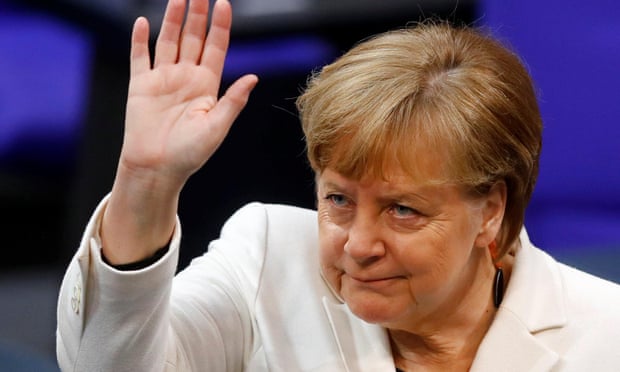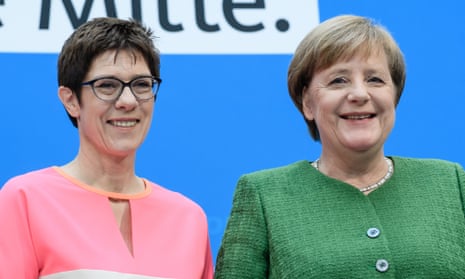Angela Merkel’s Christian Democratic Union (CDU) party is floating the idea of a new form of compulsory national service in Germany for all young people and migrants.
For over 50 years, all German men were obliged to spend a year in the army after leaving school. Those who could not, or would not, volunteered their time in community service instead.
The scheme was abolished in 2011, but the belief that young people should dedicate a year to national service persists in many conservative circles. Now, the CDU leadership, keen to reunite the party around traditional core values, is revisiting the concept.
Annegret Kramp-Karrenbauer,the CDU general secretary, suggested earlier this month that all young men and women should complete a compulsory “service year”. The plan, if implemented, would also apply to all adult asylum seekers and refugees, she added.
The programme would see some young people join the military or the fire service, or help with disaster relief. The CDU hopes others would choose to volunteer as care workers, thereby helping address chronic staff shortages in care homes and hospices.
The proposal came after Kramp-Karrenbauer – among the favourites to succeed Merkel as the head of the party – conducted a “listening tour” of the CDU grassroots, gathering ideas for a new manifesto to be presented at the forthcoming party conference in December.
“Many CDU members mentioned reintroducing the draft or general compulsory service,” Kramp-Karrenbauer told the Funke Mediengruppe news group on Saturday, adding that she still remained undecided. She also explained the suggestions she had heard often mentioned including migrants, something she thought “worth considering”.
“If refugees complete such a year, which could be voluntary or mandatory, it would help to integrate them into the country and society,” Kramp-Karrenbauer said. “It would also increase the acceptance of refugees among the population.”
Her comments were immediately dismissed as “populist” by the Social Democrats and the proposal has so far found no support from the Greens, the leftwing Die Linke, or the liberal Free Democratic party (FDP). Only the far-right Alternative für Deutschland (AfD) supports reintroducing military service.
Q&AWhat are Merkel's fourth-term priorities?
Show

A look at the main priorities set out in in the German coalition agreement, which will guide policy-making for the next four years.
Europe
Efforts to reform the EU will top the incoming government's agenda as the bloc grapples with rising nationalism, security concerns and an unpredictable US ally in Donald Trump.
As well as agreeing to bolster EU foreign and defence policy, the parties say they are ready to raise Germany's contributions to the EU's budget once Britain leaves. They also support the creation of a European Monetary Fund, but offer only cautious backing for Emmanuel Macron's idea of a eurozone investment budget.
Immigration
Smarting from the backlash over Merkel's decision to open the country's doors to hundreds of thousands of asylum seekers in 2015, the government now aims to cap the annual intake of people seeking safe haven to about 200,000.
At the EU level, Merkel says she continues to expect member states to take in their allocated share of refugees. The chancellor has also reiterated the need to tackle "the root causes of migration" with development aid for the countries of origin, while better securing the bloc's outer borders.
Future-proofing economy
Europe's powerhouse economy is booming, with workers enjoying high wages and record-low unemployment, but that has done little to assuage concerns about globalisation and automation in the workplace, as well as growing inequality.
With its flush public coffers, Merkel's government aims to address these fears through investments in infrastructure, an offensive to improve the nation's creaking internet networks, pension reform and more funding for education and life-long learning.
Meanwhile, Ursula von der Leyen, the German defence minister, has categorically rejected the idea that military service would return in its previous form – mostly because the army is not equipped to deal with the number of fresh recruits.
The German military, the Bundeswehr, currently gets enough volunteer foot soldiers but is lacking specialised soldiers willing to invest in a long-term career with the armed forces.
Still, the idea of a compulsory “service year” has a long way to go. It is possible it would require a change to Germany’s constitution, which forbids all forms of forced labour.
But for the CDU, the renewed debate has had the desired effect of rallying the party around a common cause. If the idea is adopted as policy, the party hopes it will have a similar effect on the electorate.
A compulsory service year would “strengthen social cohesion in Germany,” CDU’s minister-president of Saarland, Tobias Hans, told newspaper Bild am Sonntag. German youth get free school education and enjoy high social standards, he added. The nation “should be able to expect young people to give something back to their country” in return.
